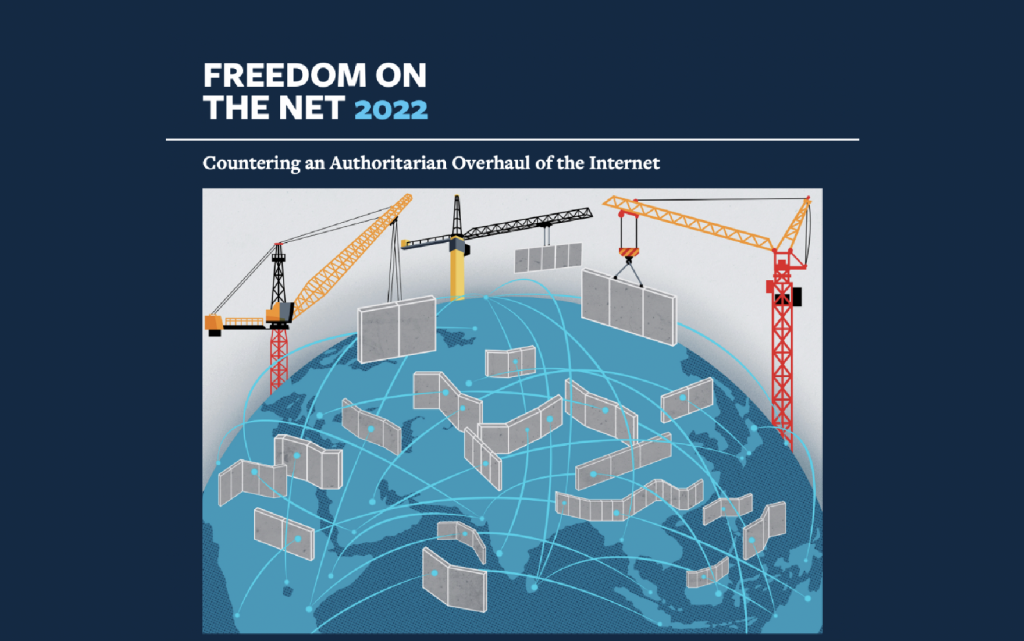Freedom on the Net 2022 finds that internet freedom in Indonesia remained under threat. Internet freedom declined globally for a 12th consecutive year as conditions deteriorated in 28 countries, while 26 countries experienced gains.
Global internet freedom declined for a 12th consecutive year as more governments erected digital barriers designed to censor dissent and monitor users, according to Freedom on the Net 2022, the annual country-by-country assessment of internet freedom released on October 18, 2022 by Freedom House. The study finds that more than three-quarters of the world’s internet users now live in countries where authorities punish people for exercising their right to free expression online. The report also found that internet freedom in Indonesia remained under threat.
The new report, Freedom on the Net 2022: Countering an Authoritarian Overhaul of the Internet, finds that the internet is more fragmented than ever, with a record number of governments imposing restrictions on what billions of people can access and share online—whether by blocking foreign websites, hoarding personal data, or increasing control over their countries’ technical infrastructure. These moves by government leaders seek to divide the open internet into a patchwork of repressive enclaves where they can advance their narrow interests and cement their hold on power.
The sharpest downgrades on the report’s 100-point scale were documented in Russia (−7), Myanmar (−5), Sudan (−4), and Libya (−4). Following the Russian military’s disastrous invasion of Ukraine, the Kremlin dramatically intensified its ongoing efforts to suppress domestic dissent and accelerated the closure or exile of the country’s remaining independent media outlets. Myanmar now hosts the second worst environment for human rights online, outperforming only China. Since the February 2021 coup, the country’s military junta has cultivated a domestic intranet to help silence opposition to its takeover and consolidate its power.
Despite an overall global decline, the report documented some significant improvements in internet freedom, made possible by the tireless work of civil society activists, media groups, and human rights defenders. A record 26 countries registered net gains in internet freedom for the year.
Internet freedom remained under threat in Indonesia, though some conditions improved. Internet access in Papua was again disrupted, with some disruptions coinciding with events related to Papuan independence. Meanwhile, government critics, journalists, and ordinary users continued to face criminal charges and harassment in retaliation for their online activity. Journalists, news outlets, and think tanks faced more technical attacks for their online reporting. After the coverage period, authorities escalated their efforts to force technology companies to comply with a law that imposes takedown and registration requirements, briefly blocking some platforms.
KEY GLOBAL FINDINGS
Global internet freedom declined for the 12th consecutive year. The sharpest downgrades on the report’s 100-point scale were documented in Russia (−7), Myanmar (−5), Sudan (−4), and Libya (−4). Following the Russian military’s disastrous invasion of Ukraine, the Kremlin dramatically intensified its ongoing efforts to suppress domestic dissent and accelerated the closure or exile of the country’s remaining independent media outlets. In at least 53 countries, users faced legal repercussions for expressing themselves online, often leading to draconian prison terms.
Governments are breaking apart the global internet to create more controllable online spaces. A record number of national governments blocked websites with nonviolent political, social, or religious content, undermining the rights to free expression and access to information. A majority of these blocks targeted information sources that were located outside of the country. New national laws posed an additional threat to the free flow of information by centralizing technical infrastructure and applying flawed regulations to social media platforms and the management of user data.
A record 26 countries experienced internet freedom improvements. Two of the larger improvements occurred in The Gambia (+3) and Zimbabwe (+3). Despite the overall global decline, civil society organizations in many countries have led collaborative efforts to improve legislation, develop media resilience, and ensure accountability among technology companies. Successful collective actions against internet shutdowns offered a model for further progress on other problems like commercial spyware.
Human rights hang in the balance amid a competition to control the web. Authoritarian states are vying to propagate their model of digital control around the world. In response, a coalition of democratic governments has increased the promotion of online human rights at multilateral forums, outlining their vision for a free and open internet. However, their progress remains hampered by problematic internet freedom practices in their own countries.
KEY INDONESIA FINDINGS
- Internet disruptions continued to occur in Papua and West Papua, often alongside government activities in the region.
- Protesters against a mine in the Central Java village of Wadas who used social media to coordinate experienced connectivity restrictions, and some were arrested.
- In October 2021, the Constitutional Court rejected a lawsuit against the use of Article 40 of the Electronic Information and Transactions (ITE) Law to restrict internet access in Papua and West Papua amid protests in 2019.
- A court sentenced YouTuber Muhammed Kece to 10 years’ imprisonment on false information charges in April 2022 over videos that authorities deemed blasphemous.
- Fewer internet users or physically attacked for their online activities than in previous years.
- The Indonesian government is suspected of buying spyware produced by Cytrox to surveil journalists and activists.
Freedom on the Net 2022 assesses internet freedom in 70 countries, accounting for 89 percent of internet users worldwide. The report, the 12th in its series, focused on developments between June 2021 and May 2022. Global findings, detailed country reports, data on 21 internet freedom indicators, policy recommendations, and report contributors can be found at freedomonthenet.org. The Indonesia report can be found here.
_____
Freedom House is a nonprofit, nonpartisan organization that works to create a world where all are free. We inform the world about threats to freedom, mobilize global action, and support democracy’s defenders.

